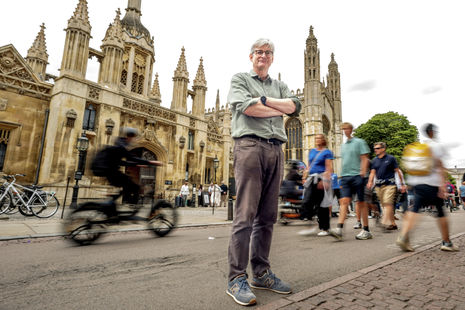In conversation with James Tweed: providing prisoners with digital learning
Sophie Ennis sits down with James Tweed, Homerton alum and CEO/founder of the digital learning company Coracle

In 2017 James Tweed found himself in a Category A, high-security men’s prison. I ask him what it was like. “Terrifying,” he says. “It’s a sort of visceral experience: the noise, the smell… the noise. I ended up in a room with who I can only describe as the scariest human being I’ve ever met in my life. […] He was my sort of height, but about twice the width and just all muscle, and he just looked at me and I thought ‘Oh my goodness, my head is going to be ripped off.’”
Tweed was there to give this man a laptop as part of a pilot project for his eLearning company, Coracle Inside, who provide prisoners with secure devices where they can access educational content. “I had to look him in the eye and say ‘Look, I trust you. I’ve got to trust you to look after this device,’” he continues. “He looked at me and, honestly, the blood must have drained from my face. And then a tear came to his eye, and he said ‘No one has ever said they trust me before.’”
“I had to look him in the eye and say ‘Look, I trust you. I’ve got to trust you to look after this device’”
Tweed admits that this moment totally transformed his working life. Coracle now operates in over 90% of public prisons across the UK, using innovative technology to help remove isolation from learning, close the digital divide, and improve the life chances of thousands of prisoners and prison leavers.
Yet working in prisons – or even in education – wasn’t part of the entrepreneur’s original plan. After studying Maritime Business and Marine Law at University, Tweed went on to spend over a decade working as a shipbroker. The evolution of his business began in the early 2000s, when he decided he was “ready for a new challenge”. “It crossed my mind that there was an opportunity to take distance learning and to digitise it,” Tweed shares, detailing how he first convinced the Institute of Chartered Shipbrokers to put some basic textbooks online. “As the years went by the type of courses we were providing broadened and we started working with people on board ships as well as people on shore.” There is, of course, no internet out at sea, and Tweed began to find himself more and more interested in the challenge of digital isolation. “If you’re interested in the world around you, these opportunities appear,” he tells me. “And then the question is, can you do something about it?”
This same desire to take action was what led Tweed back into education. “I’m not a teacher by background,” he acknowledges, which is why in 2016 he enrolled at Homerton College to study for an MPhil in Psychology and Education. Juggling both his business and a degree wasn’t easy, and he confesses that he probably had just as many late nights as the average 18-year-old undergraduate. In spite of this, Tweed speaks very fondly of his year studying at Cambridge: “It was one of the most fantastic experiences. I learnt so much.”
His original thesis idea was about the impact of access to education on a seafarer’s mindset, but there was just one problem: “Being in Cambridge, no one knows where the sea is, let alone what a ship is. And I couldn’t find anyone to supervise me.” By some coincidence, he was introduced to the Criminology department and a project called Learning Together (an initiative which allowed offenders and students to be taught alongside each other). It was through this scheme that he found himself entering a prison for the first time.
“The reality is, unless we bring back capital punishment, people are coming out of prison […] I’d prefer them to come out with a sense of hope”
Tweed doesn’t mince his words: “The reality is, unless we bring back capital punishment, people are coming out of prison. It’s just a simple truth,” he remarks. “And they’re going to be your neighbour, my neighbour… and I’d prefer them to come out with a sense of hope […] for the future.” At a time when growing numbers of prisoners are being released early, his point is hard to ignore. The more people who leave prison without the support they need to rebuild their lives, the higher reoffending rates become – something which currently costs the UK over £18bn per year.
I ask Tweed whether he thinks that our current prison crisis can ever realistically be solved while billions of pounds continue to be poured into expanding capacity instead of rehabilitation. “I have a fundamental problem, which is that I am a relentless optimist,” he laughs. “We’re at about 85,000 prisoners at the moment, and we’ll be at over 100,000 within a decade. Do I think that’s a good idea? No. Do I want to stand up and challenge the government and say ‘I think there’s another way? ’ Yes. I don’t care if they like the message or not; I’m prepared to stand up and say it because I know we’re delivering good value.”
Tweed undeniably has the data to back up these claims. Coracle currently provides a £35m per year benefit to taxpayers – that’s £16 saved for every £1 spent deploying the technology in prisons. Of course, he isn’t just driven by financial returns. Tweed tells me he lives by the philosophy that there are much easier ways to make money, but there are few jobs as rewarding as his.
He tells me with pride about one prisoner he met, who initially had no interest at all in using one of Coracle’s laptops. “He said to me ‘I failed everything at school, I’ve been in prison for 20 years, I’m too old to learn,’” Tweed recalls. But after a few more minutes of talking, the inmate revealed that he had recently become a keen chess player, and Tweed proceeded to show him the device’s chess simulator. “Within just a few minutes he had gone from having absolutely no interest to using a laptop and pushing a mouse around for the first time in his life.”
“To give back a sense of control to somebody […] is phenomenally powerful”
This may not seem like much to the average person, but Tweed explains to me the power of a simple game of chess. “When you’re in prison, your door is locked by someone else. The light is switched on and off by someone else. You’re told when to eat; you’re told when your opportunity to shower is. Everything is controlled for you. So to give back a sense of control to somebody […] is phenomenally powerful.”

Jeremy Corbyn on the future of the left
James Tweed has dedicated the last 20 years of his life to learning, and the biggest lesson he’s learnt in this time is one of acceptance. “I have learnt so much about human nature and the power of opening people’s minds. I think by giving people access to education, I’ve realised there’s no ‘one size fits all’ approach.” Tweed’s work is not just about technology or education, it’s about giving people the resources they need to build a better future. “The fundamental truth of the prison system is that society has done its bit by judging someone,” he says. “It’s not up to the rest of us to add to that judgement.”
 News / Colleges charge different rents for the same Castle Street accommodation2 March 2026
News / Colleges charge different rents for the same Castle Street accommodation2 March 2026 News / King’s hosts open iftar for Ramadan3 March 2026
News / King’s hosts open iftar for Ramadan3 March 2026 Theatre / Lunatics and leisure centres 4 March 2026
Theatre / Lunatics and leisure centres 4 March 2026 News / Angela Merkel among Cambridge honorary degree nominees27 February 2026
News / Angela Merkel among Cambridge honorary degree nominees27 February 2026 News / News in Brief: waterworks, wine woes, and workplace wins 1 March 2026
News / News in Brief: waterworks, wine woes, and workplace wins 1 March 2026







